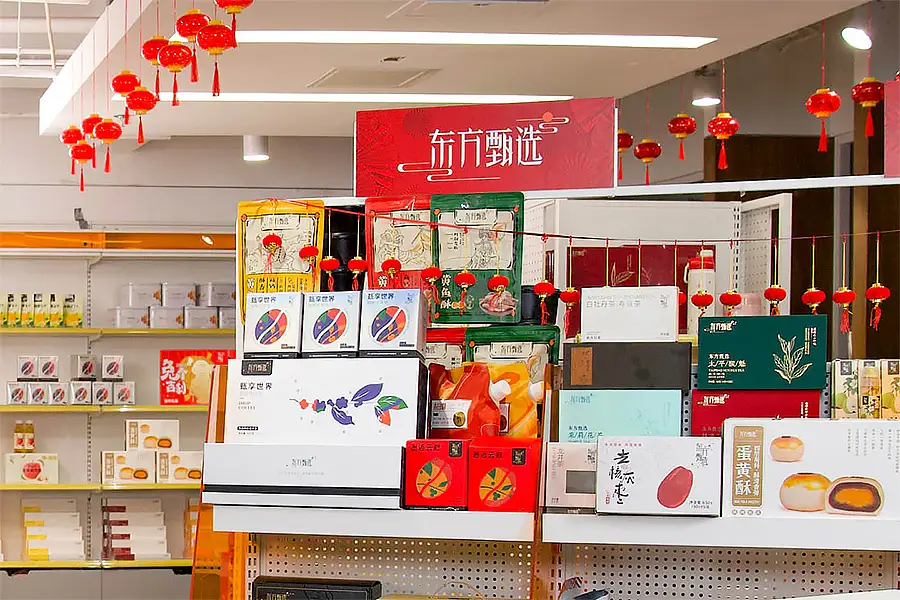Work in progress: East Buy reinvents itself – again

The former educator-turned-livestreaming e-commerce company is trying to become an online version of discount specialist Sam’s Club with its own private label business
Key Takeaways:
- East Buy returned to profitability in the six months to May, buoying investor optimism about its latest business model
- Declining revenue, profit and GMV in the recently minted e-commerce company’s latest fiscal year show its new business model is still a work in progress
By Edith Terry
When an online educator called Koolearn refashioned itself as a livestreaming e-commerce company in January 2023, the future for the newly named East Buy Holding Ltd. (1797.HK) looked promising. The former online subsidiary of private tutoring giant New Oriental Education (EDU.US; 9901.HK) made its unusual pivot after Beijing banned for-profit after-school tutoring in 2021.
East Buy charged out of the gate in its new format, reporting record revenue and profits of 4.5 billion yuan ($628 million) and 971 million yuan, respectively, in its fiscal year through May 2023, after a difficult previous year when it lost money. Things looked even better in its next fiscal year, as its revenue jumped to 7 billion yuan and its profit reached 1.7 billion yuan.
But the company’s rebound hit some sudden turbulence last year as it became embroiled in a high-profile spat with its star livestreaming host, causing its revenue, profit and gross merchandise value (GMV) to all fall sharply in its latest fiscal year through May, according to its new annual resultsreleased last Friday.
Those results show East Buy’s revenue from continuing operations tumbled 32.7% year-on-year in its latest fiscal year to 4.4 billion yuan. Most of its profits from the previous year were also wiped out, as it reported an annual profit of just 5.7 million yuan. And GMV for its core e-commerce and private label business tumbled 40% to 8.7 billion yuan from 14.3 billion yuan the previous year.
The latest results lacked any contribution from “Time with Yuhui,” the company’s wildly popular livestreaming show hosted by Dong Yuhui, a former English teacher who parted ways with East Buy after their big falling out last year. Including contributions from Dong’s show, the revenue, profit and GMV declines in the latest fiscal year would have been even larger.
The market wasn’t exactly charmed by the results, with East Buy’s shares falling 13% on Monday, the first trading day after the announcement. But even after that decline the stock is still up 76% from where it started the year.
While the latest annual declines were large, one hopeful sign was that revenues in the second half of the latest fiscal year were up marginally from the first half. And equally important, the company returned to the black with a second-half profit of 102.4 million yuan, after reporting a 96.7 million yuan loss in the first half.
According to Guosen Securities, the latest report “preliminarily validates the transformation effect of the company.” The brokerage added its view that East Buy’s new growth model, based on private-label products and a membership system, will drive new growth momentum through the creation of blockbuster products.
Guosen is not alone. Investors seem to like what they see in East Buy’s current strategy, which takes it away from over-reliance on individual livestreaming hosts and towards an online version of Walmart’s popular Sam’s Club chain of discount warehouse-style stores. The strategy appears to be gaining traction based on performance metrics.
Textbook overreliance case
East Buy’s experience with Dong Yuhui is a textbook case of a company’s overreliance on a single person for its business. By the time Dong left the company in July 2024, he took with him a livestreaming “Time with Yuhui” platform that had 20 million followers.
Dong’s popularity has only grown since then, with his fan base now up to 30 million followers, based on data from Feigua. By comparison, East Buy has lost 1.86 million followers since Dong’s departure and is down to 22nd place in the Feigua ranking. Other key influencers have also left East Buy, including “golden generation” anchors Jingwen and Dundun. East Buy CEO Yu Minhong told the departing stars good riddance, saying at a shareholder meeting that the company wouldn’t allow any of its hosts to establish their own independent platforms while at the company in the future.
Its clash with Dong aside, East Buy has also faced difficulty diversifying its livestreaming e-commerce channels beyond Douyin, the wildly popular Chinese version of TikTok. The company’s paid orders on Douyin fell by about half in its latest fiscal year to 91.6 million from 181.1 million the previous year as Dong’s contribution evaporated. Still, Douyin accounts for 70% of East Buy’s GMV.
CEO Yu has admitted that reliance on a single channel is unhealthy, but has also pointed out the new private-label membership system is a way of mitigating the risks associated with the host-oriented livestreaming e-commerce model. But its efforts to develop channels on other popular platforms, including Taobao, JD.com, Pinduoduo, RedNote and the WeChat mini store, have yet to produce the desired counterbalance to Douyin.
East Buy launched its ‘Sam’s Club’ strategy focusing on private label products and discounted prices using a members-only system back in April 2022, well before Dong’s departure. That system has been hugely successful, generating revenue of 3.5 billion yuan from private label products for the latest fiscal year – nearly 80% of the total.
East Buy sees its membership business as its future, selling its private-label products both through its livestreaming e-commerce channels and over its private membership app. The company says the East Buy brand has become “increasingly prominent in the industry, and has become synonymous with quality, accessibility and lifestyle culture.” Paid subscriptions for its private membership app, introduced in October 2023, rose 33% to 264,300 in its latest fiscal year from 198,600 the previous year.
The GMV of private-label products on the app increased to 28.8% of total GMV in the latest fiscal year from 16.3% the previous year, as individual private-label items increased to 732 from 488 over that period. Out of total GMV of 880 million yuan in June this year, 350 million yuan came from private label products, up 15% year-over-year, according to Feigua.
With a current market cap of HK$38 billion ($4.9 billion), and price-to-sales (P/S) ratio of 5.52 times, East Buy is quite a mixed bag in the analyst community. Seven of those analysts surveyed by Yahoo Finance rate the company a “strong buy” or “buy,” but another three call it a “hold” and two rate it an “underperform.”
On average, analysts expect the company’s revenue to grow about 25% in its current fiscal year, while they see its profit more than doubling as the Dong Yuhui controversy fades into the past.
Guosen Securities lowered its profit forecasts for the company for the next three years after its latest earnings release, while retaining its “outperform” rating. Huatai Securities also kept its “buy” rating and raised its revenue forecasts for the next three years. It also raised its profit forecast for the company by a slight 1% for its current fiscal year. “We are bullish on the company’s long-term development potential for steady transformation to branding,” it said.
To subscribe to Bamboo Works free weekly newsletter, click here






